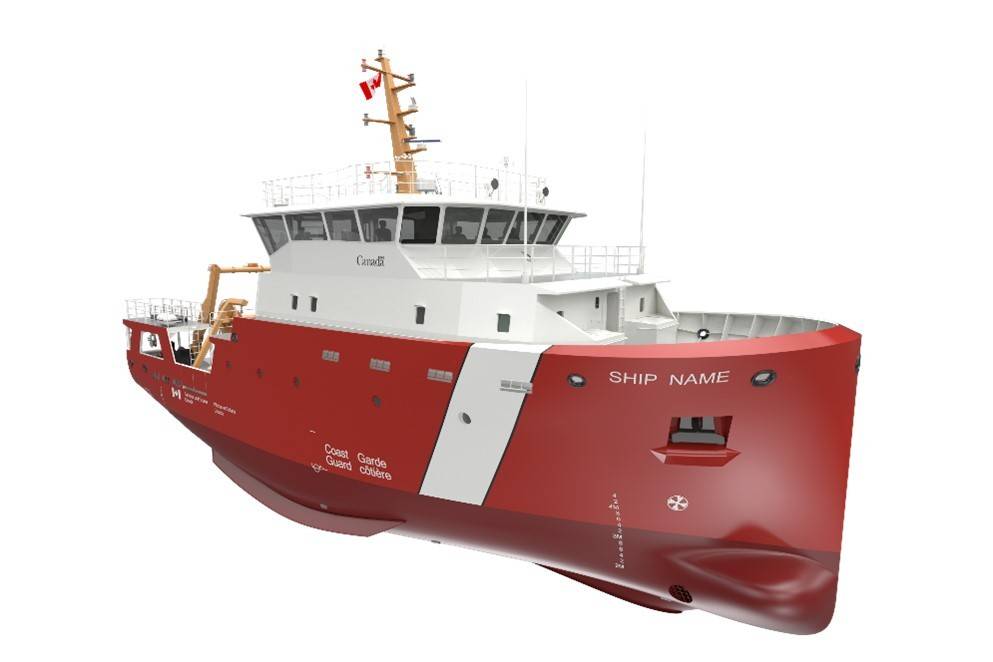In Canada and around the world, the effects of climate change and ocean warming are undeniable. To address this issue, it is more important than ever to find sustainable and resilient solutions to ensure the safety of our waters. In line with the Government of Canada's commitments to reduce greenhouse gas emissions for 2030 and 2050, the Canadian Coast Guard continues its tangible decarbonization efforts, transitioning to an increasingly green, low-carbon fleet.

Today, the Honourable Diane Lebouthillier, Minister of Fisheries, Oceans and the Canadian Coast Guard, was in Gaspé to announce the contract award for the construction of the new Near-Shore Fishery Research Vessel (NSFRV), the Canadian Coast Guard's first-ever diesel-electric hybrid vessel with a Battery Energy Storage System, designed to reduce the consumption of fossil fuels.
Following an open competitive process, Public Services and Procurement Canada, on behalf of the Canadian Coast Guard, awarded Chantier Naval Forillon in Gaspé, Quebec, a contract to build a diesel-electric hybrid NSFRV. This contract was awarded for $55.5 million (excluding taxes) as part of the National Shipbuilding Strategy, and will create and maintain up to 90 highly skilled and well-paying jobs in the region.
The NSFRV is a specialized vessel for fisheries, oceanographic and hydrographic sciences. Outfitted with cutting-edge technologies in fisheries, oceanographic and hydrographic sciences, the new vessel will undertake critical research to collect the data and information needed to help guide decision-making for sustainable fisheries and healthy ecosystems in the St. Lawrence River and Gulf region. The vessel is expected to join the Canadian Coast Guard fleet as early as 2027.
With the construction of this first-of-its-kind Canadian Coast Guard vessel, Canada is taking concrete action to fight climate change and improve vessel design to continue to provide world-class marine services, while reducing environmental impacts on our waters and marine ecosystems.
"As a maritime nation with the longest coastline in the world, Canada has a unique position opportunity to be a global leader in implementing low-carbon solutions and a blue economy for all. Today's announcement is a major milestone in the maritime history of the Gaspé Peninsula. The construction of this vessel will not only create and maintain high-skilled, well-paying jobs, but will directly and indirectly boost the economy of the entire region." - The Honourable Diane Lebouthillier, Minister of Fisheries, Oceans and the Canadian Coast Guard
"Today's announcement brings us one step closer to building a greener and more innovative fleet. This contract with Chantier Naval Forillon will provide the members of the Canadian Coast Guard with the vessel they need to continue to save lives, keep our waters secure, and protect the environment. This will also help create good jobs and strengthen the economy in Eastern Québec." - The Honourable Jean-Yves Duclos, Minister of Public Services and Procurement
"Today's announcement is a pivotal moment for the Canadian Coast Guard as we continue to align our fleet renewal plan with the use of innovative and low-carbon systems in our ships. Through the construction of the NSFRV, we are trailblazing the next generation of clean vessels and providing state-of-the-art equipment to our personnel who work tirelessly to deliver critical services on behalf of all Canadians." - Mario Pelletier, Commissioner of the Canadian Coast Guard
"It is a source of great pride for our team to have been chosen to build the Canadian Coast Guard's very first diesel-electric hybrid vessel. Today's announcement will not only maintain and create important jobs in our region, but also contribute to positioning our company as a leader in the construction of innovative ships in our markets. » - Jean-David Samuel, President and CEO, Chantier Naval Forillon
Quick facts
- The NSFRV design includes features focused on reducing power consumption such as a hybrid propulsion system with a battery bank and an energy-efficient electrical and deck equipment systems. The vessel will emit significant less greenhouse gas than a non-hybrid configuration and is able to perform some low speed operations on battery for 30-60 minutes per day. In addition, the batteries can support overnight operations to avoid using generators in harbour, and in so doing generate less pollution and ambient noise.
- The ship can accommodate a crew of 5 Canadian Coast Guard members and six Fisheries and Oceans scientists, for a total of 11 crew members. The vessel will be equipped with:
- a dry lab
- a wet lab
- a mud room
- an electronics room - The Near-Shore Fishery Research Vessel is designed to collect the fisheries and oceanographic data and information needed to understand our marine environments and make sustainable decision for Canada's fisheries and ecosystems. The vessel will also be available for Search and Rescue as well as other Canadian Coast Guard operations on an opportunity basis.
- Through the National Shipbuilding Strategy, the process of renewing the Coast Guard's small vessel fleet is well underway. To date, 17 small vessels have been delivered which includes; 15 Search and Rescue lifeboats and two Channel Survey and Sounding Vessels. So far, Chantier Naval Forillon from Gaspé, Quebec has built eight Search and Rescue Lifeboats for the Canadian Coast Guard under the National Shipbuilding Strategy, with seven of those that have been delivered across the country.
- In October 2022, the Canadian Coast Guard announced the start of a biodiesel testing project and the launch of the next phase in the construction of the Government of Canada's first hybrid electric vessel, the new Near-shore Fishery Research Vessel.
- Canada's Greening Strategy is a set of government-approved commitments that apply to all core government departments and agencies. Fleet management across the Government will be optimized to achieve the targets, including the commitment to net-zero emissions by 2050.
- The Near Shore Fishery Research Vessel build contract includes an Indigenous participation component in support of the Government of Canada's commitment to increase the participation of Indigenous businesses in federal procurement.